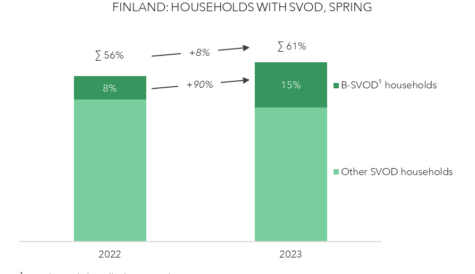
After more than 40 years of operation, DTVE is closing its doors and our website will no longer be updated daily. Thank you for all of your support.
SVoD may evolve to standalone apps
 Niche SVOD services may eventually end as standalone apps and instead be distributed as part of larger OTT services, according to research from Parrot Analytics and MIPCOM.
Niche SVOD services may eventually end as standalone apps and instead be distributed as part of larger OTT services, according to research from Parrot Analytics and MIPCOM.
The study forecasts that current market trends will “eventually lead to a period of aggregation”. This may end with SVOD apps that offer content from one network or provider, such as the Starz and Showtime offers, existing purely as add-on services of larger OTT services such as Hulu and Amazon in the US.
“By combining with a more popular OTT service, the niche SVOD providers increase the size of their potential audience, increasing the chance that their content will reach the right people,” the report suggested, adding: “The OTT platforms with the biggest user base, serving the right content to the right audience, will win.”
Other predictions in the ‘Who’s Winning in the World of the New Television?’ report, which employed Parrot’s digital data capture technology to induce results, include:
- Linear and OTT platforms will only be able to keep up with global content demand by getting the “right content, in the right market, at the right time”, and that faster rights and licensing processes would be needed to satisfy demand for immediate access
- The top broadcast shows are untraditional dramas, but that sitcoms and procedurals still demand large audience shares
- The most popular content on cable networks is aimed at young adult demographics
- Cable channels are the most diverse in terms of genre and audience, while premium cable focuses on “graphic” dramas such as Game of Thrones (pictured)
- Demand for Netflix’s SVOD titles is as high as that for top premium cable series. In contrast, advertiser-funded VOD has the least demand of the five industry segments (SVOD, AVOD, broadcast, cable, premium cable)
Parrot’s demand expression measurement, which is taken from billions of data points online including ratings and social media noise from 249 territories, shows content acquisitions will need to become “market-specific, as consumers in different countries naturally have different content preferences”.
For example, fantasy epic Game of Thrones is the most in-demand in Ireland, but trails in second place in Australia, where the lighter Pretty Little Liars is first.
“These market-specific preferences mean that even international platforms such as Netflix must curate the content available in each country; a one-size-fits-all approach will not be successful everywhere,” the reported claimed.
MIPCOM this year runs from October 17-19 in the Palais des Festivales in Cannes, France.
To read the full whitepaper, click here


